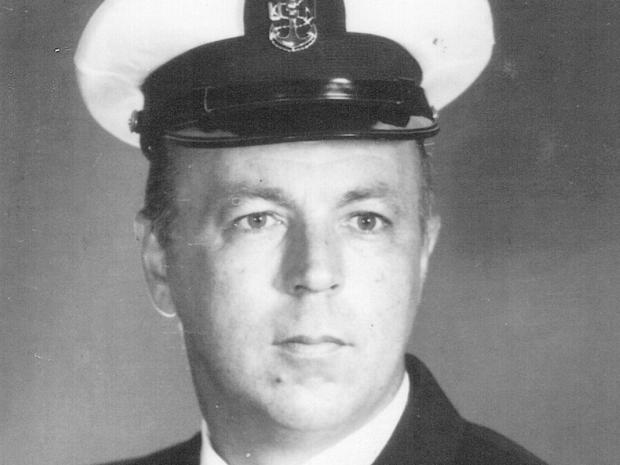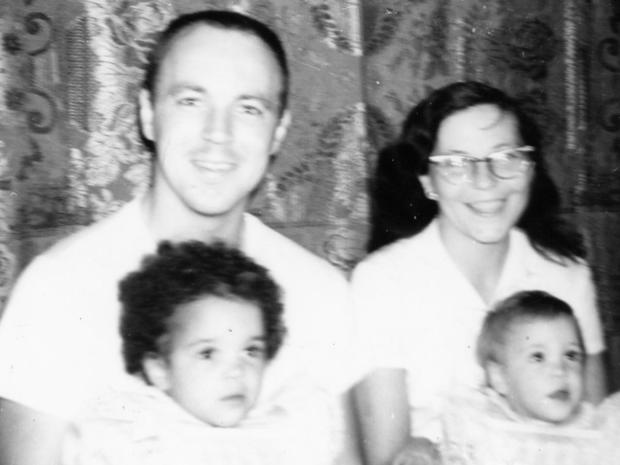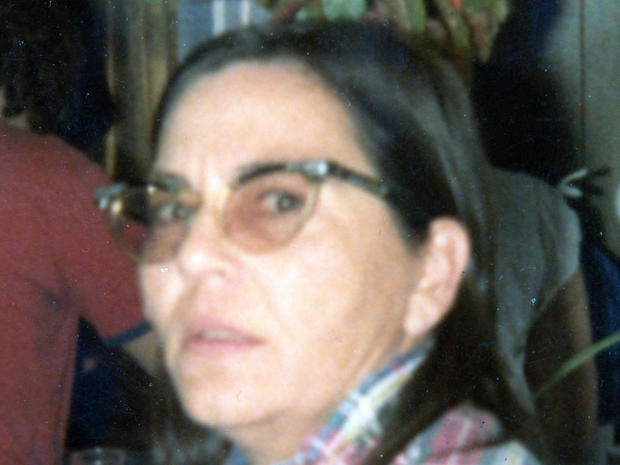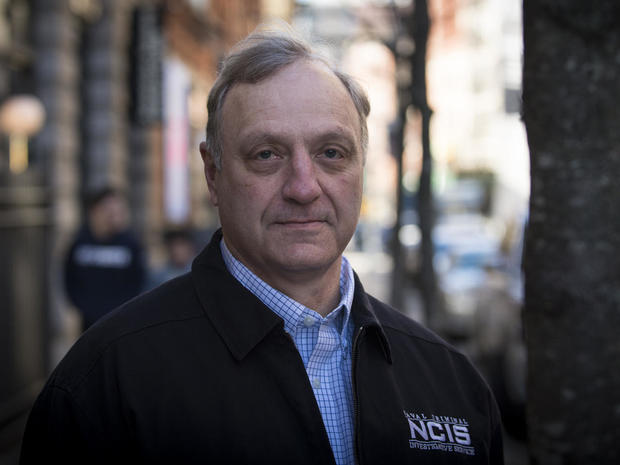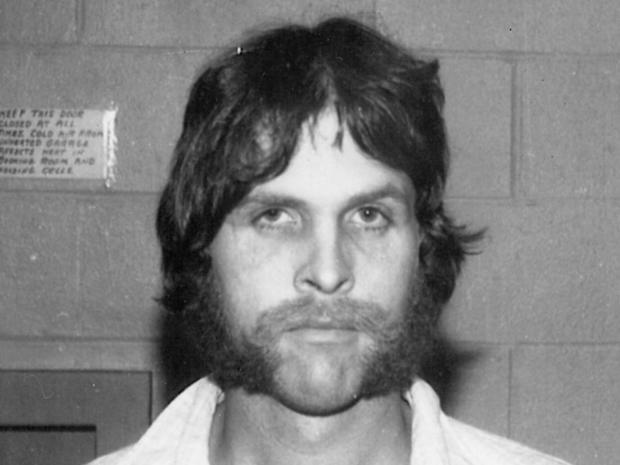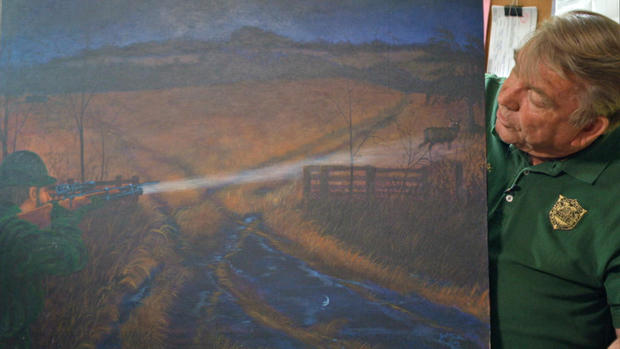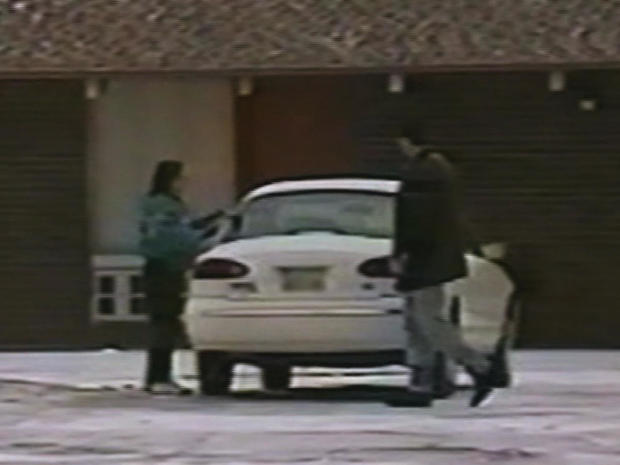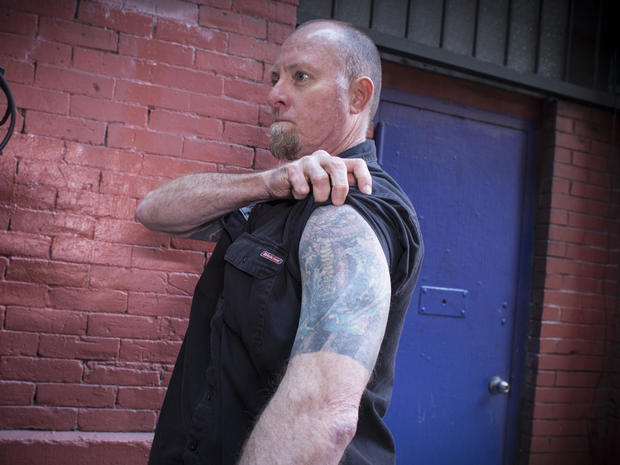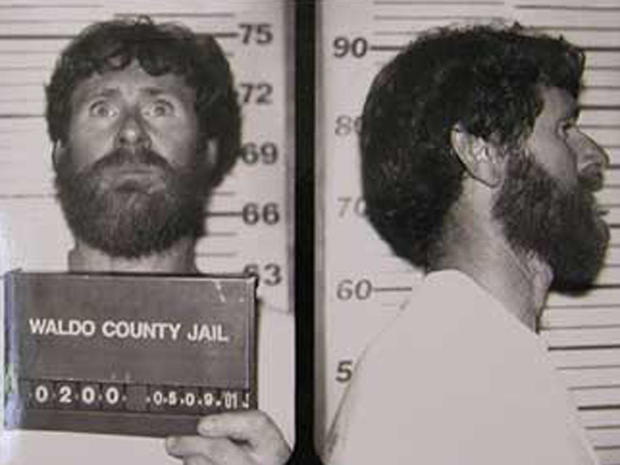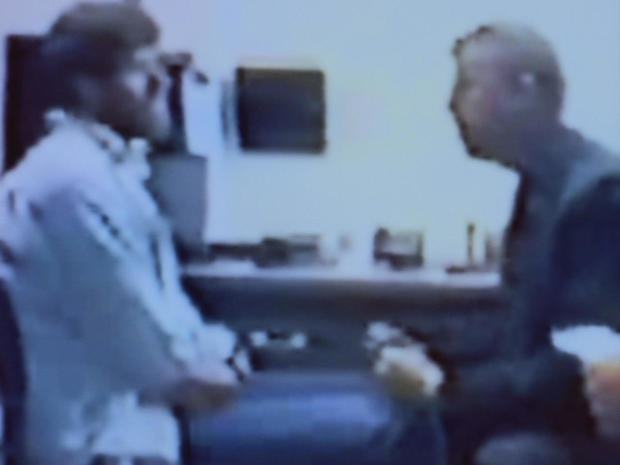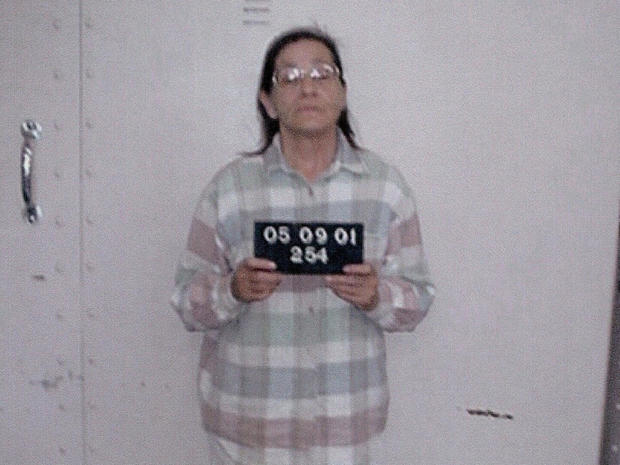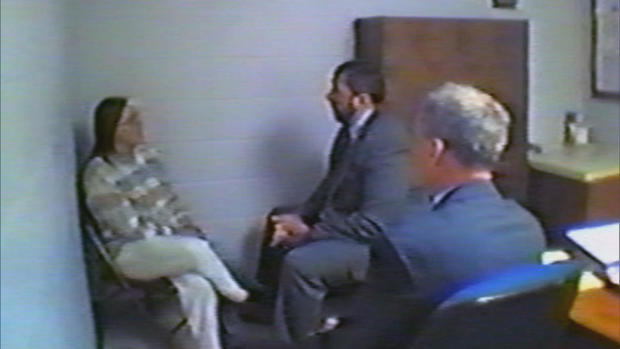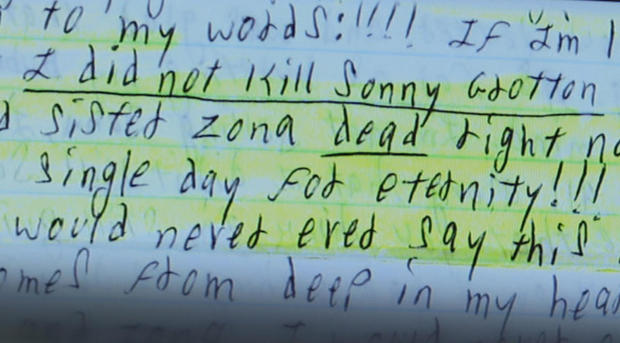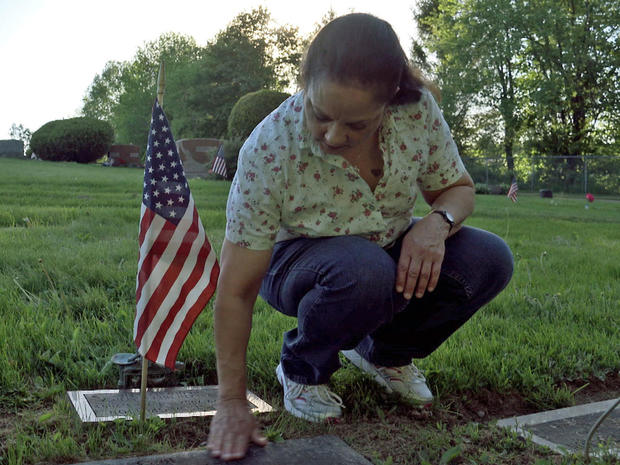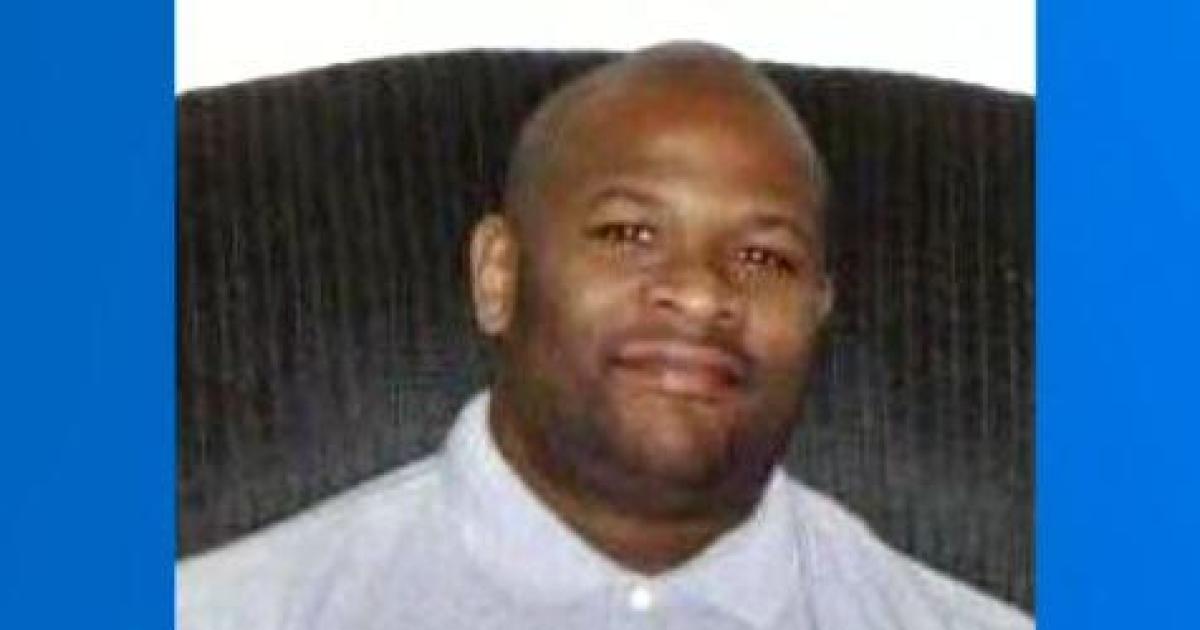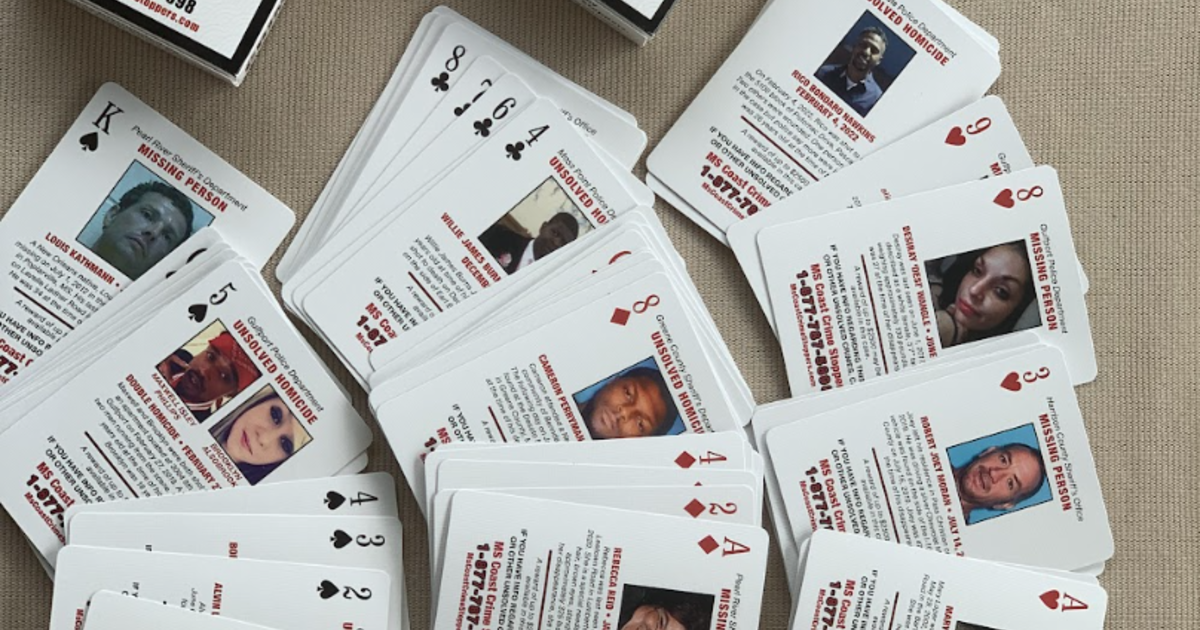"48 Hours: NCIS": The Sting
Mervin "Sonny" Grotton left work at the Naval Education Training Center in Newport, Rhode Island, for his home in Belfast, Maine. As the Navy petty officer walked to the front door that day in 1983, he was shot dead.
Local police initially suspected his wife, Norma Small, but they didn't have enough evidence to arrest her. Then the case went cold for nearly two decades until a team of NCIS agents took another look.
"I grew up in a military family," says retired NCIS Special Agent Dave Truesdale, a tough, tattooed law enforcement professional with a black belt in martial arts. "Any time that I see a military member hurt by somebody, it does push me to resolve that incident."
In this case, the agents had a hunch that Small was involved in some way. As they peeled back the layers, agents say they found out she had a much different life when her husband was away on duty, one that involved other men. But was that enough to want her current husband dead?
To get evidence, they had to risk their lives by going undercover. "Undercover operations can be very dangerous. Best case scenario you blow your line," Truesdale explained. "Worst case scenario-- you get killed."
SONNY GROTTON GUNNED DOWN
The years have not diminished Rosalyn Grotton's affection for her father, Mervin Sonny Grotton.
Rosalyn Grotton | Daughter of Sonny Grotton: He had the biggest heart and was so giving and so honest and so hard working and so loving.
Jeff Morrow | Retired NCIS Special Agent: Sonny Grotton was a machinist mate chief petty officer in the U.S. Navy. At the time of his death, he had been in the service almost 25 years.
Agent Jeff Morrow: He had been working in Newport, Rhode Island, at the Naval Education Training Center helping to train new officers on shipboard equipment and other surface warfare-type skills.
Mark Nickerson | Former trooper, Maine State Police: It's been 33 years since I was here so it's changed some since I was here last.
Mark Nickerson: I was a trooper with State police back in 1983 … I got called here 8:45 in the evening.
Mark Nickerson: He got out of his vehicle… and didn't even make it to his home and was shot in the walkway.
Agent Jeff Morrow: He was shot first … in the left hip. And then a second shot ripped through his left upper arm, went through his -- torso, out his back and he fell. The third shot was at exceptionally close range.
Mark Nickerson: Just the way the whole thing unfolded, it shocked this area. Mr. Grotton was executed.
Rosalyn was actually on the phone with her mother, Norma, who was inside the house when Sonny was gunned down.
Rosalyn Grotton: …it sounded like a car or a truck backfiring in the background. And I asked her, "What was that? Is dad home now? Is something wrong with the truck -- backfiring or something like that?" And she said. "I gotta go." So she hung up really quick.
Rosalyn Grotton: …and it wasn't very long after that my grandmother called me, hysterical on the phone and she said, "Rozzy, you've got to come over, your dad's been shot." And I'm like, "Oh, my God."
Who would want Sonny dead?
Agent Jeff Morrow: When Sonny was away in Newport – working -- for the Navy, his wife, Norma, had sorta taken on -- a different lifestyle -- takin' advantage of the freedom that she had.
Agent Jeff Morrow: We started to pick up information that she may have been involved in extra-marital affairs … she was involved in drug use and some drug sales. And was living a life that was very much different than the one that Sonny may have known about her.
Rosalyn Grotton: She was kind of like … well it's an awful thing to say, but it's true -- kind of Jekyll and Hyde-type of person. She could be fine one minute and then the next minute you want to duck because something is gonna go flying and you're gonna get hit.
Rosalyn Grotton: My dad was such a nice person that he would be helping everyone else in any spare moment that he had …And it would piss my mother off to no end. …Because she was a selfish person and he was a giving person. They were brought up two totally different ways.
Rosalyn remembers a childhood when her mother was already starting to pull away from her father.
Rosalyn Grotton: In the sixth grade, I had the lead in "Cinderella." I was so excited. I mean who wouldn't be excited about being Cinderella, right?
Rosalyn Grotton: Well, my mother pulls in with a station wagon. And she says, "Come on. Get in. Let's go. We're leaving. We're goin' to California." And she had left dad again.
Rosalyn Grotton: There was always a man involved. …there were several. I mean we were supposed to call them uncle whoever or they didn't have a name. …I couldn't recall exactly how many.
But after decades of forgiving his wife, Sonny told Rosalyn he was fed up.
Rosalyn Grotton: He's like, "I can't do this anymore." And he'd had enough. And that was in November. He died in December. And I'm like, oh, my God. After what, you know, thinking about it later, that was just so messed up and so wrong.
Right from the start, cops focused on Norma.
Mark Nickerson: I was confident that when our detectives showed up within a half an hour they were gonna be lugging her out in handcuffs, and when it didn't happen I was shocked.
Agent Jeff Morrow: They got to a certain point in the case-- but sufficient evidence just didn't exist to charge anybody responsible in the case.
Seventeen years passed before a newly-formed NCIS cold case squad made Sonny's murder a priority.
They started with their prime suspect.
Agent Jeff Morrow: Norma Small had been interviewed a total of 11 times. And -- she had not admitted any culpability in-- in the murder. I really came to the conclusion that interviewing Norma again without any new information-- would probably be—fruitless.
It was time for a new approach.
Agent Jeff Morrow: We had to develop some direct evidence against those that we believed could be involved.
Agent Jeff Morrow I learned about Dave Truesdale's undercover work. And realized that he was pretty good at it. …He's worked with ex-cons… He knows what they think. He knows what they act. He can talk like them.
Dave Truesdale | Retired NCIS Special Agent: Undercover operations -- are valuable in a variety of different ways. In the Sonny Grotton case, it was immensely valuable … there was no other way that you could use traditional methods to go after her.
Agent Dave Truesdale: This was a very unique role that I had to play, I took from my past all the other roles that I played as a kind of tough guy … and went up against somebody who at the time could have been my mother.
NCIS GOES UNDERCOVER
Agent Jeff Morrow: For us, cold cases present an investigator challenge. They haven't been solved before … we may have a little bit of competitiveness … and a desire to see the case resolved … no murder should go unsolved.
Dean Jackson | Retired detective, Maine State Police: During the investigation, the State Police interviewed a lot of people, friends of Norma. …Norma also made comments to people about how Sonny would be worth a lot more dead than alive. She would receive insurance money… She also had told people that she dreaded when Sonny came home and was kinda happy when he left for the week.
Agent Jeff Morrow: We always thought there was some financial motivation for this. So as part of the investigation we took a look at her finances and what exactly did she receive when Sonny died. And it was a death benefit from the Navy. She received the real estate she owned with Sonny and she received a monthly payment from the V.A. that over 15 or 17 years had amounted to almost $100,000.
Det. Dean Jackson: Norma was interviewed quite a few times … One of the things that she was asked to do is take a polygraph.
Rosalyn Grotton: "I'll go with you. And just take the stupid lie detector test because you didn't do anything wrong, so what are you afraid of?" She wasn't guilty of anything, so why not take it?
Det. Dean Jackson: She wouldn't take the polygraph, so that's kind of a red flag.
Police were convinced that Norma was involved and may have even hired a hit man -- a notorious local outlaw named Joel Fuller.
Agent Dave Truesdale: I've been around some really bad people in my career. Joel is the personification of evil. When you look at him, you get the chills. And I think a lot of others felt like that too.
Fuller got on investigators' radar after his friend, Larry Phillips, came forward to police saying Fuller bragged about a murder and even showed him the creek where he threw the murder weapon.
Det. Dean Jackson: Joel proceeded to tell Larry that he used the rifle to kill Sonny Grotton. …he did take a polygraph test and he did pass. So … we felt pretty comfortable that Larry was telling the truth.
John Ford | Former sheriff, Belfast, Maine: Joel Fuller was a highly talented, smart individual with no scruples.
No one knows fuller better than former Sheriff John Ford.
John Ford: I really got to know Joel Fuller back when I was a game warden because he was one of the lawbreakers.
The law breaker and the lawman developed an unusual friendship.
John Ford: He called himself the "deer hunter" and he called me "the other side."
John Ford: People look at it and they say, "Well, you know, you're in law enforcement. Why have you got this relationship? … I guess my philosophy is that … that I've learned a lot about him. I've learned a lot about what his lifestyle was like.
And what he learned was that Fuller was unusually smart and talented.
John Ford: The talent that he's got from his paintings is just unbelievable. …He tells about how he shot over 50 deer a year -- And 'John boy, I hope you like this painting. Yes it's me with the light." And it looks like him.
Fuller went to prison just two years after Sonny Grotton's death for killing two drug dealers in an unrelated case.
John Ford: No question about it. There's probably no other person who's as cold blooded as he is from shooting deer to shooting people.
And Joel Fuller was in prison when NCIS came up with their sting operation -- a plan to make the connection between Norma and Fuller.
Agent Jeff Morrow: What we came up with is -- what if -- what if Joel Fuller had a buddy in prison that he served time with, but was now out … and was able to make contact with Norma and ask her some questions.
That buddy was Agent Truesdale, who would try to get Norma to confess to the plot.
Agent Dave Truesdale: I was probably at the time one of the most experienced undercover operatives or special agents in NCIS.
Norma had moved to Kansas City years earlier. And despite years of living off Sonny's death benefits from the Navy, she had fallen on hard times and was working as a cleaning lady at a motel. That's where Dave Truesdale met her for his undercover sting.
Agent Dave Truesdale: In this undercover operation, I identified myself as Tony.
Agent Truesdale to Norma Small [Undercover video]: My name's Tony I'm a friend of Joel Fuller –he sent me here to talk with you. …Listen the police have come back from talking to Joel and he's scared.
Agent Dave Truesdale: I explained to her that Joel had received information that somebody was cooperating in the investigation. And he believed it was her.
Agent Truesdale [Undercover video]: And he wanted me to come out here. I owe Joel some favors in the penitentiary and he's heard that somebody's cooperating in this case.
Norma Small: Sure ain't me honey, no sir.
Agent Truesdale: Now Joel didn't really think it was you.
Norma Small: No, no way….but I don't know who it could be…
Agent Dave Truesdale: And right away she said, "I'm not cooperating with the police. I didn't tell them anything."
Agent Truesdale [Undercover video]: Obviously I'm not here to hurt you because I'm here talking to you.
Norma Small: …and I don't wanna hurt Joel or anyone else, but I ain't talking to nobody… I ain't pullin' the plug on nobody and I expect the same. They tried to tell me that he was implicating me … what they're doing is they're lying to get some info, but didn't work.
Agent Truesdale: You didn't do nothing?
Norma Small: No sir.
Agent Dave Truesdale: Right then we knew that we were onto something. We suspected that she was involved from the very beginning. But we knew now.
For the first time— after 11 police interviews and after 17 years—Truesdale began to win Norma's trust. She offered new information: a new name and a new twist to the case.
Norma Small: …big tall fellow, what is his name—
Agent Dave Truesdale: The big guy, tall guy… Boyd.
Norma Small: Boyd -- Boyd Smith -- he was a friend of the family, he was the only other one that knew.
Agent Jeff Morrow: Almost simultaneously we look at each other when she said Boyd Smiths' name. And we kinda -- with a puzzled look our face like, "Who is this guy?"
"A FRIEND OF THE FAMILY"
Agent Dave Truesdale: This was a 20-year-old homicide—the worst crime you can commit. It had languished and nothing had been resolved.
But now investigators had a new name.
Agent Dave Truesdale: I had no idea who Boyd Smith was. So then I had to suddenly start rolling on Boyd Smith and tryin' to dig and find out what the relationship was.
Agent Truesdale [Undercover video]: Find a pen I need that boy's name. What's his name?
Norma Small: Boyd Smith -- he was a friend of the family.
Agent Jeff Morrow: Turns out Boyd Smith is a former boyfriend of one of the Grotton children. And from time to time, actually lived in the home with Norma and her children and her daughter.
Agent Truesdale [Undercover video]: What did you tell him?
Norma Small: I was gonna hire him, that's what I thought the plan was. OK.
Norma's plan was to hire her daughter's former boyfriend to kill her husband.
Rosalyn Grotton: I couldn't believe that this person that I had had a relationship with a year before that was capable of even thinking about doing something like that.
Agent Dave Truesdale: And so after I started askin' her about Boyd, she said, "I didn't hire Joel. I hired Boyd."
Agent Truesdale: What's the deal with Boyd?
Norma Small: He was the one that was supposed to do the thing.
Agent Truesdale: Did he get cold feet, is he a chicken-s---.
Norma Small: Yeah, kinda I guess, I don't know what his problem was.
Agent Dave Truesdale: Boyd Smith lived in a house in the woods in Belfast, Maine … we went to his house … He completely disavowed any knowledge of -- of the homicide. We went back and forth, back and forth. Ultimately, he admitted that Norma came to him and asked him several times to kill her husband.
So Truesdale, acting as tough guy "Tony," was eager for more. He set up a second meeting with Boyd.
Agent Dave Truesdale: … and he agreed to meet us, and said he got off for lunch at noon, gave us directions to a cemetery, which was kind of unusual, and he'd meet us at the cemetery:
Agent Truesdale to Boyd [Undercover at cemetery]: This is a good place because we were looking around trying to make sure there was no cops here. Because that was my big concern that you were going to run to the cops last night and then come and we were going to get whacked today.
Agent Dave Truesdale: We weren't sure initially whether Boyd had actually participated in the killin'.
Agent Truesdale [Undercover at cemetery]: What was the actual agreement with you and Norma? How did all that come about?
Boyd Smith: Norma wanted her husband gone, and that was the bottom line. She was always bitching-- rah rah rahing-- about it and this and that. And she asked me if I would do it. Actually she asked me several times. Now I thought about it and thought about it and thought about it and told her, I says I got cold feet, said no way, can't do it.
Det. Dean Jackson: Boyd said he waited at the corner of the house and he tried to imagine shooting Sonny or killing him and he got physically sick, started vomiting and he realized and he just couldn't do it.
Agent Jeff Morrow: He chickened out. He couldn't kill him. She was angry. And that she insisted that -- he find somebody else.
Boyd Smith [Undercover video]: And then she said can you put me in contact with – arrange something?
Agent Truesdale: And then you put her in contact with Joel?
Boyd Smith [Affirming]: Mmm hmm.
Rosalyn Grotton: My mother had asked him if he knew anybody else that could do it and he was like, "Oh yeah, Joel Fuller. He'll do anything for money including killing someone..."
Det. Dean Jackson: Boyd went down to Rollies and he found Joel Fuller and he put Joel in touch with Norma.
Boyd's admission was enough to arrest him. So Dean Jackson and an NCIS agent sat him down for a formal interrogation-- with camera rolling. They needed Boyd to come clean—and tell them who killed Sonny Grotton:
Det. Jackson: Norma's version of this is, she of course she's trying to wash her hands of it. She says I got Boyd to do it and he got Joel. That's what he told me
Boyd Smith: Well, she's lying because I didn't tell her that I got Joel … I may have suggested that well, OK, you know, try to get a hold of Joel Fuller or try to get a hold of – or maybe he knows somebody.
Det. Jackson: So you knew who Joel was.
Boyd Smith: Oh … I had heard about Joel. Everybody in -- everybody in Waldo County's heard about Joel.
Det. Jackson: What did you hear about him?
Boyd Smith: … that he was cold, that he was available, he was in the drug scene, that he was a nut case, do anything for money.
Boyd Smith: I didn't know Joel back then. I did not put Norma and Joel in touch with each other. That is the truth.
That contradicts what Smith told Agent Truesdale -- that he was the one who put Joel Fuller in touch with Norma:
Det. Jackson She said you made the arrangements. You told her you made the arrangements.
Boyd Smith: She's lying.
Agent Morrow: Well, what's your story?
Boyd Smith: I told you my story.
Agent Morrow: That doesn't work.
Detective Dean Jackson needed Boyd to admit he was the go-between. So after hours of an aggressive interrogation, he tries a different approach:
Det. Jackson [puts his hand on Boyd's shoulder]: Boyd, come here. Listen to me; you listen to me right now. …This is your time to tell the truth. You're going down the drain right now.
Agent Morrow: That's it, you're done, man.
Det. Jackson: This is almost lookin' like you're the man that pulled the trigger.
Jackson could sense Boyd was about to break:
Det. Jackson: It's alright, come on tell us. Get this off your chest. …Come on, come on Boyd.
Boyd Smith: I met Joel at Rollies … told him that I knew somebody that was looking for somebody dead. …I gave him Norma's address and Norma's name.
Rosalyn Grotton: And it's like-- that's just too wild. You just don't … do you really know your parents? Do you really know your spouse? Do you really know your children? It kinda makes you almost paranoid. Do you know anybody? You know, it's scary.
QUESTIONING NORMA
Once Boyd Smith had confirmed to investigators that Norma was the force behind Sonny's killing -- even if Joel Fuller pulled the trigger -- police had her in their sights.
Boyd Smith: She said, "I'd like to see him dead."
Boyd Smith: I thought she was just yanking my chain.
Det. Jackson: OK. When did you realize she wasn't?
Boyd Smith: When she offered me money.
After 18 years, 13 interrogations and four undercover stings, Norma Small was arrested.
Det. Jackson: Norma has been arrested. She's on her way in right now.
Boyd Smith: Um, hmm.
Det. Jackson: They're gonna sit down and talk to her just like we're talking to you.
John Dyer: Norma, hi. I'm John Dyer, I'm with the Maine State Police.
NCIS Agent: I'm with NCIS.
Norma Small: Whatever that is.
NCIS Agent: Naval Criminal Investigative Service.
Rosalyn Grotton: My sister called me, 'cause she was living at the time, and said, "Mom's been arrested." And I'm like, "What?" And it's like, oh, my God, for the murder of Dad. And I'm like, holy crap.
As agents began interrogating Norma, they had one overriding question: why?
NCIS Agent: It's just a question that we want to clear up of what was going on in your life. What was going on in Sonny's life? What led up to this? How did it get this bad? Was it just an overreaction to an emotional situation that you later regretted?
Norma Small: I just got tired of the bulls---.
John Dyer: Yeah. What, what kind of bulls--- though, I guess, is what we're looking at.
Norma Small: Oh, just picky, aggravating things.
Rosalyn Grotton: I couldn't understand why, because Dad was always such a nice person. He never raised his voice. He never raised a hand … it's not like he was abusive or being mean. Anytime she wanted anything, she got it
NCIS Agent: Let's go through what led up to that -- who did you approach, what took place, what did you say?
Norma Small: Boyd.
John Dyer: Boyd. And, and what did you say to Boyd?
Norma Small: Ah, I asked him if he would.
John Dyer: And again, I don't want to put words in your mouth.
Norma Small: Yeah.
John Dyer: But he would do what
Norma Small: If he would take care of my husband for me.
John Dyer: And by take care what do you mean?
Norma Small: Well, take him out, to put it simply.
NCIS Agent: Are you saying kill your husband—is that…?
Norma Small: Yeah.
NCIS Agent: OK.
Agent Jeff Morrow: When the homicide occurred -- it was clear that it was -- that it was because Sonny was getting ready to retire from the Navy. …And was gonna be moving back home to Maine and would be there all the time. And that the lifestyle that she had developed -- whether it was the running around, or the involvement in drugs and the social life that she seemed to like, that wasn't gonna happen anymore. So she had him killed.
Agent Dave Truesdale: My feelings on Norma were kind of disbelief. …when we tried to discuss with her the motive for doing this, what you and I would normally deal with through a divorce, a breakup -- she dealt with through murder.
John Dyer: And what were you offering Boyd to do that?
Norma Small: Do I have to tell you that too?
NCIS Agent: Ah, it's part of the truth.
Norma Small: You know already, yeah.
NCIS Agent: We'd like…
Norma Small: Yeah, ten.
John Dyer: Ten thousand. OK.
Agent Jeff Morrow: The information that we developed was she offered $10,000 to kill Sonny Grotton. …There was enough unaccountable cash from her bank accounts to indicate that she could've paid somebody.
It was money she'd gotten from her husband's pension.
NCIS Agent: Do you think that you are necessarily entitled to those benefits having been the one responsible for setting up Mervin's death?
Norma Small: [Nods, affirming]
NCIS Agent: You honestly think you're entitled to that money, how come?
Norma Small: Because if I didn't I wouldn't have nothing to live on…
Norma Small: I tried working. That took too much out of me.
Agent Jeff Morrow: The best way to describe Norma is just cold.
NCIS Agent: ... your creator has given you forgiveness for the death of Mervin, is that what you're saying?
Norma Small: Uh-huh.
NCIS Agent: You have been forgiven?
Norma Small: He put me, he's been, ah, I'm right at ease, I mean, I have no, no quims (sic), ah, no...
NCIS Agent: No guilt.
Norma Small: ...no, no, nothing.
NCIS Agent: No ill feelings…
Norma Small: No, no.
NCIS Agent: I mean, ah, in a, in your mind...
Norma Small: It makes me feel good.
NCIS Agent: You know that you made a mistake, but you have no guilt about it.
Norma Small: No.
NCIS Agent: Any of your children ever suspect anything or…
Norma Small: No. No.
NCIS Agent: They never brought this up that they thought that you might be responsible for Sonny's death or anything
Norma Small: No.
Rosalyn Grotton: And then they showed us the -- part of her -- interrogation and they asked her, "Well, how do you think your children are gonna feel about this?"
NCIS Agent: Do you think the kids will have same peace of mind or how do you explain this to them now.
Norma Small: They'll understand.
Rosalyn Grotton: And she just nonchalantly says, "Oh, they'll understand." And I'm like, totally appalled and about ready to lose my lunch, to say the least. I couldn't believe it. We're just looking at each other, my brother and me and it's like, "who is this woman?"
But there was one big problem with Norma's confession—she insisted she never had any contact with Joel Fuller.
NCIS Agent: ...even if you didn't really have a personal relationship or know Joel, isn't it true that Boyd had let you know that Joel was gonna be the trigger man?
Norma Small: No.
John Dyer: Why would he say something like that?
Norma Small: I don't know.
John Dyer: That's what I'm wondering.
Norma Small: I don't know.
John Dyer: Is he lying about that?
Norma Small: Yeah, he must be because I had no contact with Joel whatsoever.
Even without every link of the murder chain established, in 2002, Norma Small, Boyd Smith and Joel Fuller each went on trial separately for the murder of Sonny Grotton.
JUSTICE SERVED?
Investigators were near the finish line in the Sonny Grotton murder, bringing the three accused conspirators to trial. And though everyone believed Joel Fuller was the trigger man, former sheriff and unlikely pen pal John Ford had some doubts.
John Ford: He always signs the letter, "a friend from the other side."
John Ford [Reading letter]: "John, listen to my words. …If I am lying to you when I tell you that I did not kill Sonny Grotton, may the Lord strike my mom and sister Zona dead right now, and they both live in hell every single day for eternity. "
Det. Dean Jackson: Joel denies he did it. And all you can do is just look at all the evidence and … make your own determination. …I think the strongest piece of evidence is the detail that Joel gave Larry Phillips.
Remember, Larry Phillips was Fuller's friend who went to police after Fuller bragged about the murder and showed him the weapon.
Det. Dean Jackson: That is information that nobody should know, except for the shooter.
Det. Dean Jackson: Norma had said that Boyd Smith was the only other one who knew. … But I think Boyd's personality -- I don't think he has the guts to shoot somebody in that manner.
Mark Nickerson: It looked like an execution. …somebody's lying in wait he backs in, he gets out of his vehicle, he walks to his house and somebody shoots him … execution style.
Det. Dean Jackson: I mean that's an up close and personal thing. It makes more sense that Joel would be capable of something like that. …Joel was an avid hunter … he's used to shooting, he's used -- to killing things. …He has done other murders in -- in kinda the same manner. Boyd … I just don't see that killer instinct in him.
Joel Fuller's trial was tough for the prosecution.
Agent Jeff Morrow: Some of our key witnesses were a bit frazzled. Testimony was probably not as strong as I -- I hoped it would be. There were some—decisions made regarding admissibility of some evidence.
Fuller told John Ford the testimony of Larry Phillips – the prosecution's key witness -- was weak.
John Ford: He says, "My attorney made Larry look so bad that the jury … they knew that he wasn't tellin' the truth.
Det. Dean Jackson: Larry Philips did -- a terrible job testifying. …I think he was intimidated by Joel. And he had smoked some pot before he came in to testify to try to relax himself, and he was just a mess by the time he got up on the stand.
Fuller was brought from his jail cell to court, but he did not testify.
Agent Dave Truesdale: The evidence was there. All the testimony was there.
But the jury saw no direct link between Fuller and Sonny Grotton. He was acquitted.
Agent Dave Truesdale: …and when the jury came back and found Joel not guilty … shock. I mean just total disbelief.
Fuller remains in prison serving a life sentence for those two other murder convictions.
John Ford: I have a tendency to believe that he really didn't do it. He claims that Boyd Smith is the murderer.
Agent Jeff Morrow: Boyd's … role is that of a middleman.
Boyd does not deny his role as the middleman.
Agent Jeff Morrow: We felt … that he committed a conspiracy to commit murder. …Because this case was as old as it was, the statute of limitations on conspiracy to commit murder had run and the only choice that the A.G. had to charge him with was murder.
Agent Dave Truesdale: Boyd's trial was interesting. He confessed during the undercover:
Agent Truesdale: And then you put her in contact with Joel?
Boyd Smith: Uh-huh.
Agent Dave Truesdale: He confessed during-- the post-arrest interrogation.
Det. Jackson to Boyd Smith: It's alright, come on tell us… get this off your chest.
Agent Dave Truesdale: And he actually testified on the stand to what he did. He confessed on the stand. So you have three confessions.
Det. Dean Jackson: The jury had sent out -- a question … to the effect … "Can we convict Boyd of anything else, except for murder? Like solicitation or -- or some other crime?" …And you know, of course, the judge said, "No, the charge is murder."
Agent Jeff Morrow: his defense was that he removed himself from the conspiracy before the crime-- was actually committed.
Det. Dean Jackson: I think the jury felt a little sorry for him … that's what it seemed.
Agent Jeff Morrow: He was acquitted.
A few months later, on July 29, 2002, Norma Small went on trial for the murder of her husband.
Agent Jeff Morrow: We gained … Boyd Smith's … cooperation in the trial of Norma Small. …Norma was charged with murder and receiving the death benefits that resulted from Sonny's death. …Boyd's testimony was critical in that case.
As was Dave Truesdale's undercover sting.
Agent Dave Truesdale: There's probably not a day that goes by that she … doesn't think about Tony, whoever the heck he was, that undercover guy. …Norma would've seen me in the gallery.
Norma Small took the stand and said she had nothing to do with Sonny's death. Incredibly, she said she had just told investigators what they wanted to hear.
Det. Dean Jackson: She got up on the stand and testified and I think the jury could see that she wasn't really being truthful—
Especially when they heard Norma's own words on tape.
Agent Jeff Morrow: Norma was convicted … on both charges.
Agent Dave Truesdale: I was … in court when Norma was found guilty … it was a sense of relief.
Agent Jeff Morrow: She received a total of 70 years in state prison.
Agent Dave Truesdale: She was the one, the only one out of all three, that was found guilty
Det. Dean Jackson: I think justice was served. You have the person that started this whole thing. If it hadn't have been for this one person, Sonny would not have been murdered
Agent Dave Truesdale: Homicide is the ultimate crime. …there's nothing else above homicide… When you resolve something like that -- it's a tremendous feeling of success.
Rosalyn Grotton: My dad, Sonny Grotton was the greatest dad in the world… I could just use just about every good adjective that there is known in the dictionary to describe him. …any time you needed anything, he was right there. …He was just-- he was just super wonderful. He really was.
Rosalyn Grotton: My dad has been six-feet under since 1983 and she's still living, she's still breathing. She's watching TV, she's eating food, and my tax dollars are payin' for her medicine and it really pisses me off because it shouldn't be like that. …I believe in an eye for an eye. I'm sorry, but when you do something like that, the same thing should be done to you. …just let it be over. It's not really over until she's gone. …I think that's the biggest part, is it's not gonna be over until she's gone … the whole chapter, the whole book.
48 HOURS: NCIS
Miss an episode of the six-part series? Catch up here.
